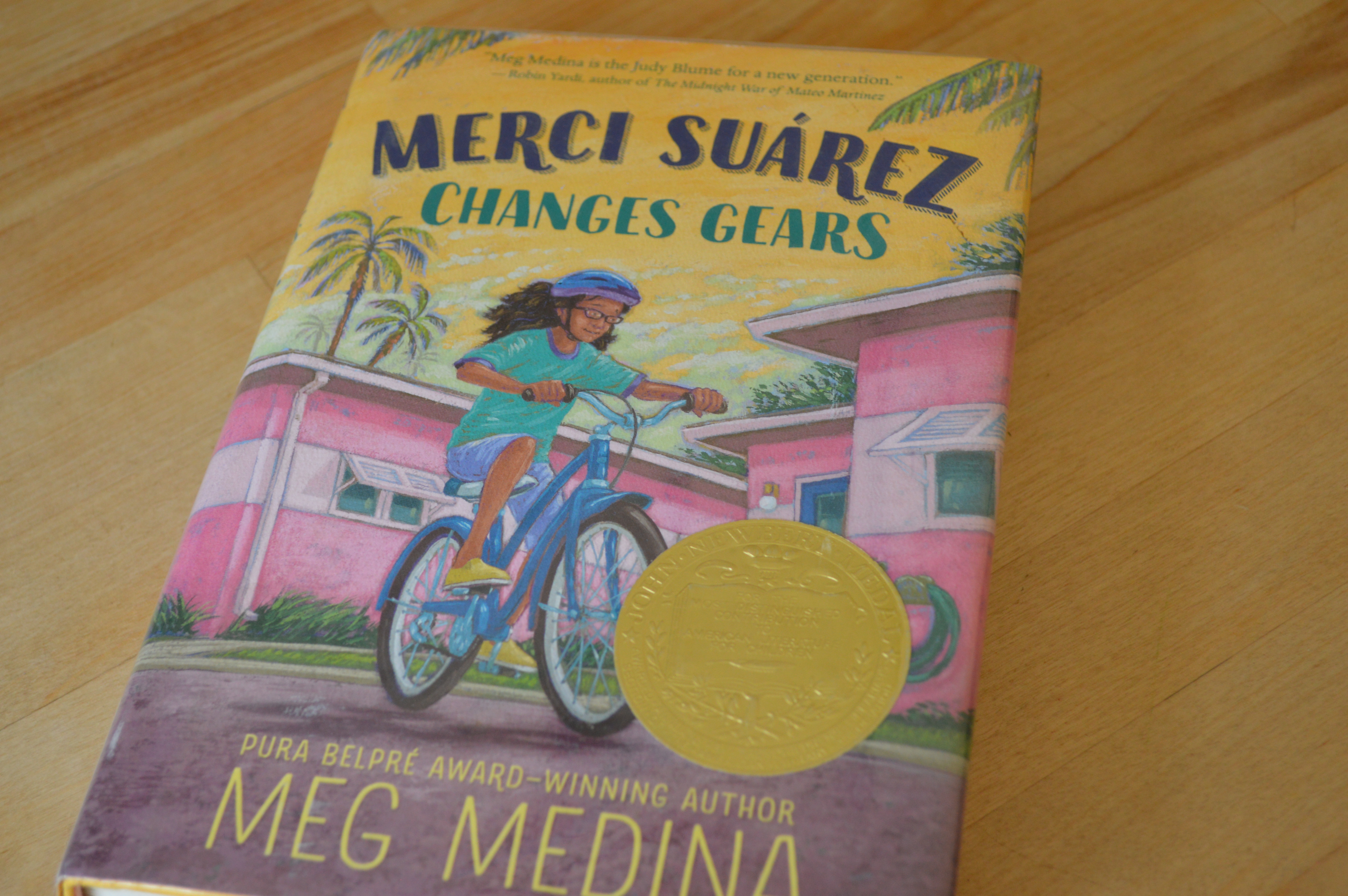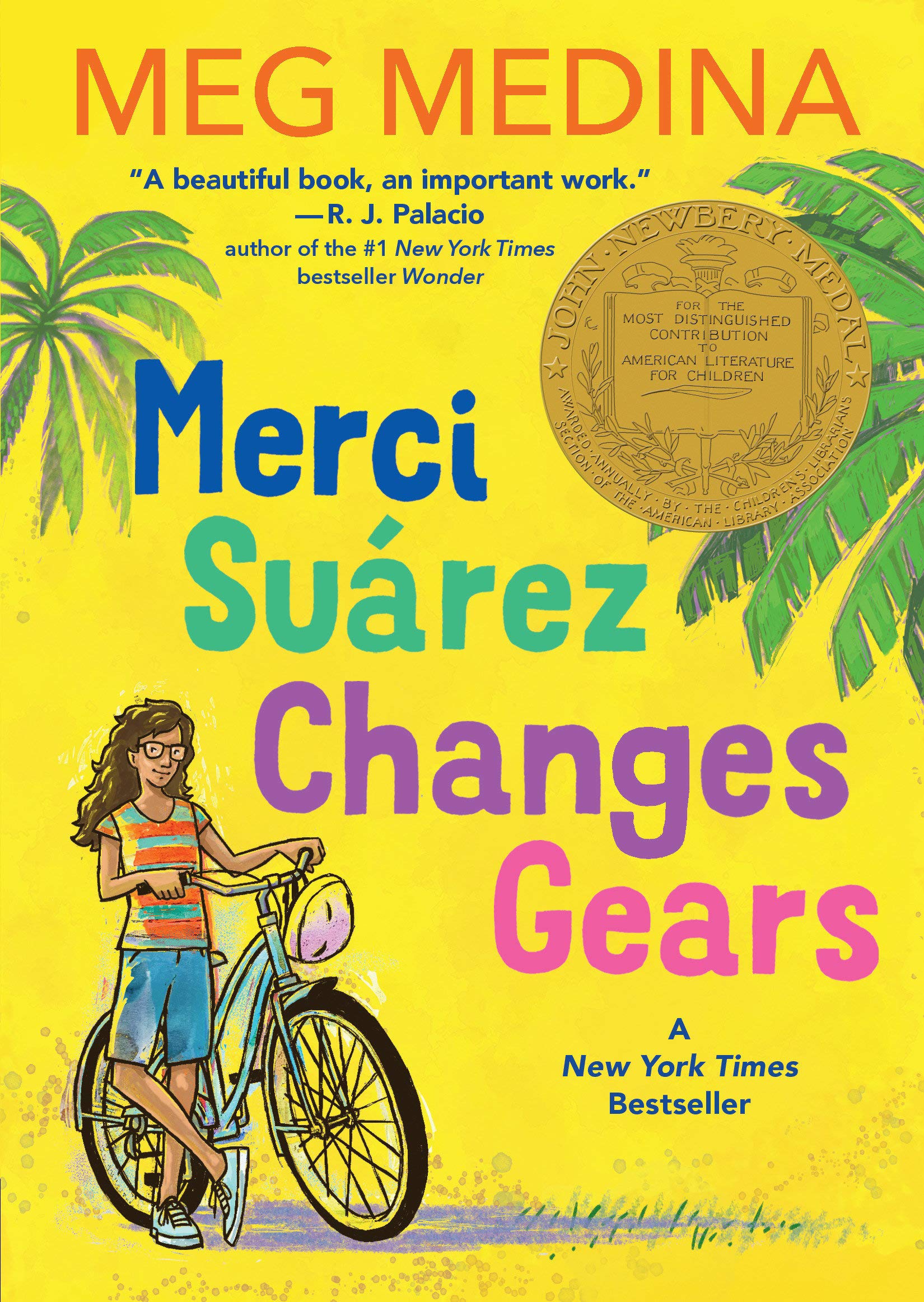
2019 Newbery winner, Merci Suárez Changes Gears by Meg Medina follows Merci’s sixth grade year as a scholarship student at a fancy prep school while her grandfather’s neurological health deteriorates. Merci wants everything to stay the same, but middle school is not the same as grade school, with popular girl Edna driving her crazy and friendship with boys suddenly complicated. Also, while no one wants to explain to her what is going on with her beloved Abuelo Lolo, she knows something is not right.

What I liked. I loved the picture of the extended, vibrant Latino family. I especially loved the little shout out to Hialeah, Florida (p. 122) where my college roommate Jeannete grew up with her extended family. Getting to live with Jeannete and meet her sister and her cousins, and have her mom greet me over the phone on a regular basis was such a sweet part of having Jeannete as a roommate and dear friend. I thought that this book captured a lot of that warmth and cultural practice (Christmas fireworks!) that I got to know from Jeannete.

What was interesting/ some limitations: This is going to have some spoilers in it, so skip it if you haven’t read the book and want the full experience. As an adult, reading this book, I guessed that Lolo had Alzheimer’s very early on when it came out in the first chapters that he had tried to take the wrong twins home from school pick up (like page 22), but Merci doesn’t find out until page 267. Somewhere in between, I felt confused about how the other adults in the household could be taking Lolo to so many doctors appointments and not be talking about at least a possible Alzheimer’s diagnosis. Now, when Merci does find out, it is explained to her that Lolo explicitly asked that she not be told for as long as possible because he wanted things to stay the same for as long as they could, and for Merci not to be burdened before she needed to be. So that did explain a lot to me, and my experience of confusion was an intentional one that mirrored Merci’s. Midway through the book, I think I would have labeled how long it took Merci to be told about Alzheimer’s as a limitation, but by the end of the book I felt like it was an intentional choice that I respected and I thought worked.
It did make me wonder how a child reading the book who had very little knowledge of Alzheimer’s would experience Lolo’s behavior and Merci’s confusion about it. Children’s books often are introductions to these sorts of challenging issues, and it’s an interesting question about what one could assume a middle grade reader would and would not know about Alzheimer’s or other medical conditions. I think that overall Meg Medina did a good job writing for both an audience that would have no background in Alzheimer’s like Merci, and those who would but would also understand Lolo’s request.

Similarity to other Newbery winners. In some ways with the setting of a Latino-American family, which a Newbery award winning book has not had had since …And Now Miguel (1954), and theme of Alzheimer’s makes fairly unique. But in other ways a female protagonists transitioning into middle or high school is a well developed theme in books like Invincible Louisa by Cornelia Meigs (1934), Caddie Woodlawn by Carol Ryrie Brink (1936), Thimble Summer by Elizabeth Enright (1939), Strawberry Girl by Lois Lenski (1946), Miracles on Maple Hill by Virginia Sorensen (1957), A Wrinkle in Time by Madeleine L’Engle (1963), Up a Road Slowly by Irene Hunt (1967), Summer of the Swans by Betsy Byars (1971), Dicey’s Song by Cynthia Voigt (1983), The View from Saturday by E. L. Konigsburg (1997) (school), A Year Down Yonder by Richard Peck (2001), Kira-Kira by Cynthia Kadohata (2005), Criss Cross by Lynne Rae Perkins (2006), The Higher Power of Lucky by Susan Patron (2007), When You Reach Me by Rebecca Stead (2010), Moon Over Manifest by Clare Vanderpool (2011), and Flora & Ulysses: The Illuminated Adventures by Kate DiCamillo (2014).

What it teaches me as a writer. I think what I really appreciate about this book as a writer is how well Meg Medina captured the voice and thoughts of a 12-year-old girl. Merci is observant but not in a hurry to becoming a dating teenager. I liked that there are sufficient complexities of childhood and family in this book. When I think back to being 12, I do tend to remember looking ahead to what it would be like to be a teenager, but most of my day to day life was more like Merci’s. I was concerned about my female friends, and rarely if ever talked about crushes (even if I thought about them often). I mostly thought about school and church and extra curriculars and family, and found the girls who were into make-up and boys simultaneously glamorous and annoying. Twelve is both very young and yet I feel fairly connected even now to who I was at 12, almost like it was the beginning of my adult self. It’s a great age to try and capture, and I feel inspired by Meg Medina’s superb job of doing that in Merci.

Have you read Merci Suárez Changes Gears? What are your favorite books about Latino families ?
*Note* This post contains Amazon affiliate links, which means if you were to buy a book, I’d get a tiny commission at no cost to you. Thanks for supporting Stories & Thyme!*